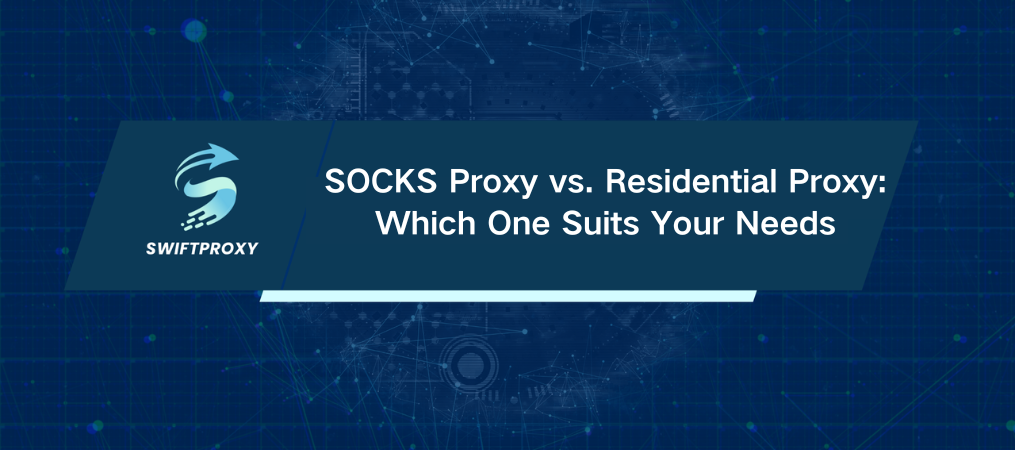SOCKS Proxy vs. Residential Proxy: Which One Suits Your Needs

In today's digital world, proxies are more than just tools—they're essential for securing data, maintaining anonymity, and bypassing location-based restrictions. If your business involves online marketing, gaming, or data scraping, understanding which type of proxy best fits your needs is key.
Let's dive into two of the most popular proxies—SOCKS and residential—and break down what they can offer to help you make an informed choice.
What's the Deal with SOCKS Proxies
SOCKS, which stands for Socket Secure, is a versatile proxy protocol that supports a wide range of network services. Unlike HTTP proxies that only handle web traffic, SOCKS can relay data for FTP, SMTP, POP3, and even UDP-based applications. This makes SOCKS proxies perfect for diverse use cases, from browsing and instant messaging to file sharing and online gaming.
SOCKS5, the latest version, stands out because it adds encryption and authentication features, which enhance security and privacy during data transmission.
Benefits of SOCKS Proxy:
Multi-Protocol Support: Supports everything from HTTP to FTP, UDP, and more.
Flexibility: Can handle various internet traffic, including P2P, gaming, and video streaming.
Speed: Perfect for fast-paced applications that need quick data transfers, like online gaming or large file downloads.
What's the Deal with Residential Proxy
Residential proxies use real IP addresses assigned by ISPs (Internet Service Providers) to households. Because they appear as if they're coming from regular users, they provide an extra layer of anonymity, making it almost impossible for websites to detect you're using a proxy.
This makes them the go-to option for tasks that require stealth and privacy—like large-scale data scraping, social media management, and market research—where avoiding IP bans is a priority.
Benefits of Residential Proxy:
Superior Anonymity: Since they use real IPs, websites are less likely to flag your traffic as suspicious.
Bypass Restrictions: Perfect for bypassing geographical or IP-based blocks.
Reputation Boost: Real household IPs lower the chance of being labeled as a bot or malicious traffic.
SOCKS Proxy vs. Residential Proxy: What’s the Difference
Not all proxies are created equal, and understanding the key differences between SOCKS4, SOCKS5, and HTTP proxies can help you choose the right one for your business needs.
SOCKS4 proxies are ideal for basic web browsing and file transfers, offering fast speeds but with limited functionality. They only support TCP protocols, lack encryption, and do not provide authentication options, which means they are not the most secure option for privacy-conscious users.
On the other hand, SOCKS5 proxies provide much more flexibility and security. Supporting both TCP and UDP protocols, they are suitable for P2P activities, gaming, and video streaming. SOCKS5 proxies also come with encryption and allow for username and password authentication, making them a more secure option compared to SOCKS4 proxies, with a higher level of privacy.
HTTP proxies are specifically designed for web traffic and are perfect for SEO purposes, data scraping, and browsing. They are fast for HTTP-based traffic, but they do not support encryption and only use basic authentication. Although they are very fast and efficient for web tasks, they provide low privacy compared to SOCKS5 proxies.
Which Proxy Type Is Right for Your Business
Your choice between SOCKS and residential proxies depends on your specific needs. Here's a quick guide:
For Web Scraping: If your primary goal is scraping websites or performing SEO tasks, HTTP proxies are your best bet. They're fast, efficient, and optimized for handling HTTP traffic.
For Complex Protocols: Need flexibility for P2P file sharing, streaming, or gaming? Go for SOCKS5 proxies. They support multiple protocols and ensure better security and privacy with encryption and authentication.
For High Anonymity: If avoiding bans is critical—say, for large-scale data scraping or bypassing geo-restrictions—residential proxies are the ideal choice. They offer high anonymity by using real residential IPs, making your traffic blend in like a regular user.
Why Choose Swiftproxy
When it comes to reliable, secure, and efficient proxy services, Swiftproxy stands out. With a focus on customer satisfaction and cutting-edge technology, Swiftproxy offers proxies that help businesses stay ahead in the digital age. Whether you need network acceleration, privacy protection, or the ability to bypass geographic restrictions, Swiftproxy has you covered.
Their easy-to-use interface and robust backend system make it simple to manage and utilize proxy services, no matter your business size.
Conclusion
In the end, choosing the right proxy comes down to your business's specific needs. SOCKS proxies are a great choice for multi-protocol support, especially for activities like gaming and file sharing. Residential proxies, on the other hand, are your go-to option when anonymity and avoiding bans are paramount—ideal for scraping and bypassing IP blocks.
With the right proxy service in place, you can unlock the full potential of your online operations, enhancing efficiency, privacy, and security. Make a careful choice.

















































